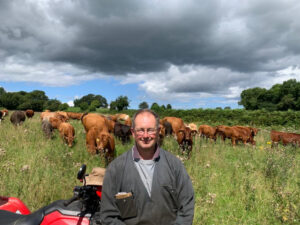The Protein Crop Grower of the Year award recognises excellence in the cultivation of protein-rich crops. Entrants will be evaluated based on their achievement of key performance indicators, successful pest and disease management, and promotion of soil health. Additionally, a strong emphasis will be placed on innovation and efforts to reduce carbon footprint. The winning grower will showcase a proactive approach to adapting to evolving conditions.
Simon Andrews – Porchester Farms
The introduction of beans and peas into the rotation at Porchester Farms has paid dividends, according to Simon. Using Lynx spring beans and LG Element vining peas as break crops, the business has seen greater control of grassweeds and wild oats, as well as being able to spread the workload.
The vining peas are grown for seed, which has provided access to premiums above the feed market. Simon says the greater level of scrutiny in the seed market has proven to be a worthwhile discipline across the rotation and has reduced resistance, as there is a longer break between pulses.
Protein crops are established after stewardship stubbles or a crop of turnips grazed off by sheep. In most cases, no slug pellets are applied, and the business uses foliar feeds to improve foliage, rooting and pod set, leading to high yields. Simon says insecticide use has been minimised by applying orange oil extract to control black bean aphids, while phosphite is used in place of fungicides to tackle downy mildew.
 The benefits of pulses extend across the full rotation. Simon notes that the bean roots do a good job of soil conditioning, with straw being chopped and put back into the soil. This means the following wheat crop can be direct-drilled to reduce establishment costs. It’s also a clean break, with no slug problems passed over to the following crop, unlike with oilseed rape.
The benefits of pulses extend across the full rotation. Simon notes that the bean roots do a good job of soil conditioning, with straw being chopped and put back into the soil. This means the following wheat crop can be direct-drilled to reduce establishment costs. It’s also a clean break, with no slug problems passed over to the following crop, unlike with oilseed rape.
Additionally, the nitrogen-fixing enables fertiliser rates to be cut in wheat, while the reduced weed burden means herbicide use can be minimised.
As for the business, along with Simon, three full-time operators handle the agricultural operations, all with health and safety qualifications and training for the relevant equipment. A staff welfare programme has also been introduced, with online and phone access to confidential counselling.
Guy Prudom – P Prudom and Son
Spring beans are fed back into the Prudom beef finishing enterprise, making up part of a wide rotation that also consists of two wheats, oilseed rape and spring and winter barley. About 25ha of Lynx spring beans was grown for the 2024 harvest, with Vespa as a winter variety.
 Beans are established with a Mzuri strip-till drill and wholecropped at 40% dry matter to be mixed into the total mixed ration for weaned and finishing cattle. Extra protein comes from red clover leys, which are sown to tackle grassweeds and revitalise fields, and then ensiled to be fed over winter.
Beans are established with a Mzuri strip-till drill and wholecropped at 40% dry matter to be mixed into the total mixed ration for weaned and finishing cattle. Extra protein comes from red clover leys, which are sown to tackle grassweeds and revitalise fields, and then ensiled to be fed over winter.
The crop was introduced as a way for the farm to reduce its reliance on imported soya. Beans were initially fed alongside 1kg a head/day of soya, with crimped barley and silage. However, by completely removing soya from the ration, the farm has not only seen a reduction in costs (up to 37p a head/day) but also a cut in its carbon footprint. On a whole-farm basis, the business’ footprint is 25kg carbon dioxide equivalent/kg of meat produced.
This has been achieved while still meeting the requirements of the end market, with 90% of finished beef cattle hitting the correct grade and 95% meeting the weight specifications at slaughter.
P Prudom and Son was farming organically when it added beans to the rotation, but now farms conventionally. Still, no insecticides are used in the bean crops and fungicides are omitted in low-pressure situations. The farm also uses the break crop as an opportunity to tackle grassweeds with chemistry not available to them in other crops. Some broad-leaved species, such as field pansies and speedwell, are allowed to establish in low levels to boost biodiversity.
Wholecropping means weeds and their seeds are transported off the field, leaving a clean seedbed for the next crop. The earlier harvesting date means the worst of the weather is avoided as well. For plant health, 2.5t/ha of gypsum is applied before planting, with phosphate and potash added during the growing season using variable-rate technology, based on soil testing.



